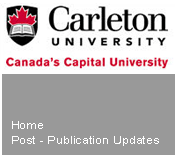Integrated Science
Institute of Integrated Science
Faculty of Science
This section presents the requirements for:
Graduation Requirements
In addition to the requirements listed below, students must satisfy:
- the University regulations including the process of Academic Performance
Evaluation (see the Academic Regulations of the University section
of this Calendar),
- the common regulations applying to all B.Sc. programs including those
relating to Science Continuation and Breadth requirements (see the Academic
Regulations for the Bachelor of Science Degree),
General Information
The Integrated Science (IS) programs offered by the Faculty of Science
provide undergraduate students an opportunity to design a program of study
that blends a concentration in science with a linked area of specialization
in another Faculty. The science concentration can be in any one of the
following areas: physical, earth, life, or mathematical (including computer)
science. In the associated specialty area outside of the Faculty of Science,
a pattern of courses is selected that corresponds to one of the Fields
of Study listed below. In this way, the student acquires a depth of understanding
of a particular branch of science integrated with knowledge that will
aid in the application of that understanding in a professional or employment
context.
First-year students must submit their proposed course selection to the
IS Director for approval before commencing second year. The progress of
all students is monitored by the IS Committee.
An Honours program and a General program are available. Both require
a course of independent study (ISCS 4908 [1.0], ISCS 3909) as an important
element in the program.
Academic Performance Evaluation for IS
The Academic Performance Evaluation for students in Integrated Science
is based on the Major CGPA and the Overall CGPA. The Major CGPA is calculated
over the combined credits in the Science Sequence and the Non- Science
Sequence (13.0 credits for Honours, 9.0 credits for General.)
Program Requirements
Integrated Science
B.Sc. Honours (20.0 credits)
Detailed programs in IS are constructed and approved on an individual
basis. All IS Honours programs adhere to the following structure.
A. Introductory Credits (5.0 credits):
- 1.0 credit in MATH 1007 and MATH 1107;
- 2.0 experimental Science credits chosen from two of Biology, Chemistry,
Geology, Physics;
- 2.0 credits chosen from Science, Mathematics, Arts, Social Sciences,
Computer Science (except COMP 1001 or COMP 1001) or Engineering;
B. Science Sequence (9.0 credits):
- 5.0 credits selected from the Faculty of Science at the 2000-level
or above;
- 3.0 credits from the Faculty of Science at the 3000- level or above;
- 1.0 credit in ISCS 4908 [1.0];
C. Non-Science Sequence (4.0 credits):
- 4.0 credits in an inter-related specialized area selected from outside
the Faculty of Science;
D. Additional Requirements
- 2.0 credits in free electives;
- At least 2.0 credits in Items 1 to 8 above must be chosen from the
Faculties of Arts and Social Sciences or Public Affairs and Management.
Note: Item 4 above may include up to 1.0 credit 1000-level computer
science.
Integrated Science
B.Sc. General (15.0 credits)
Detailed programs in IS are constructed and approved on an individual
basis. All IS General programs adhere to the following structure.
A. Introductory Credits (5.0 credits):
- 1.0 credit in MATH 1007 and MATH 1107;
- 2.0 experimental Science credits chosen from two of Biology, Chemistry,
Geology, Physics;
- 2.0 credits chosen from Science, Mathematics, Arts, Social Sciences,
Computer Science (except COMP 1000 or COMP 1001) or Engineering;
B. Science Sequence (6.0 credits):
- 4.0 credits selected from the Faculty of Science at the 2000-level
or above;
- 1.5 credits from the Faculty of Science at the 3000- level or above;
- 0.5 credit in ISCS 3909;
C. Non-Science Sequence (3.0 credits):
- 3.0 credits in an inter-related specialized area selected from outside
the Faculty of Science;
D. Additional Requirements (1.0 credit):
- 1.0 credit in free electives;
- At least 2.0 credits in Items 1 to 8 must also be chosen from the
Faculties of Arts and Social Sciences or Public Affairs and Management.
Note: Item 5 above may include up to 1.0 credit 1000-level computer
science.
In IS programs, all Technology, Society, Environment (TSE) Studies courses
are considered Non-Science credits.
Fields of Study
1. Health Science — preparation for Medicine, Dentistry, Nursing
Science, Pharmacy, Veterinary Medicine.
A program in Health Science comprises a science sequence drawn from the
life sciences (biology, biochemistry and chemistry, psychology) and a
non-science sequence from the social sciences (psychology, sociology,
and/or business).
2. Science Education — preparation for teaching at the primary
or secondary school levels. A program in Science Education combines a
science sequence in any one of the science areas of concentration with
an appropriate non-science sequence.
3. Forensic Science — preparation for a career or graduate study
in forensic analysis (such as DNA analysis, trace evidence techniques,
drug testing and toxicology). A program in Forensic Science has a science
sequence that emphasizes analytical laboratory techniques and provides
a sound basis in fundamental biology and chemistry. The non-science sequence
is drawn from a list of relevant courses in anthropology, sociology (criminology),
law and psychology.
4. Science and Business — preparation for a career involving the
management of innovation in either the private or public sectors or for
post-graduate studies in business administration. A program in Science
and Business consists of a science sequence in any one of the science
areas of concentration and a non-science sequence developed in consultation
with the School of Business of the Faculty of Public Affairs and Management.
The non-science sequence meets the requirements for the Minor in Business
degree designation.
5. Science and Policy —preparation for a career in the public
service and/or non-governmental organizations or for post-graduate studies
in the administration and regulation of innovation, science and technology.
A program in Science and Policy consists of a science sequence in any
one of the science areas of concentration and a non-science sequence of
courses in Business, Economics and Political Science (including those
courses required by the Faculty of Engineering for the Concentration in
Management designation).
6. Science and Communication — preparation for a career in media
communications and public relations. A program in Science and Communication
combines a science sequence in any one of the science areas of concentration
with a non- science sequence developed in consultation with the School
of Journalism and Communication of the Faculty of Public Affairs and Management.
The non-science sequence meets the requirements for the Minor in Mass
Communication degree designation.
7. Science and Ethics — preparation for a career as an analyst
and/or publicist in either the private or public sectors or for post-graduate
studies in either science or philosophy. A program in Science and Ethics
links a science sequence in any one of the science areas of concentration
to a non-science sequence of philosophy, ethics and public affairs credits
that meets the requirements of the Minor in Philosophy degree designation.
Because of the complementary presence of Environment Canada’s National
Wildlife Research Centre on Carleton’s campus, exceptional opportunities
exist for directed study in the area of environmental ethics.
8. Science and the Arts — preparation for any career that requires
a breadth of scientific and humanistic knowledge, this field offers an
individualized but coherent program that instills the literacy, critical,
analytical and problem solving skills that can only be acquired through
the study of both the sciences and the humanities and social sciences.
A program in Science and the Arts consists of a science sequence in one
or more areas of concentration and a non-science sequence of arts and
social sciences credits developed by the student in consultation with
an Integrated Science Studies adviser.
9. Science and Technology — A program in Science and Technology
consists of a science sequence in one or more areas of concentration and
a non-science sequence of credits drawn from courses offered by the Faculty
of Engineering and Design and by Technology, Society, Environment Studies.
10. Information Science — A program in Information Science consists
of a science sequence selected from computer science and mathematics &
statistics; non-science sequence consisting of an appropriate selection
of courses in Arts & Social Sciences (particularly recommended are
courses in mass communication, Art & Culture, Psychology, and Sociology)
and TSE.
11. Information Technology — The science sequence is selected
from computer science and mathematics & statistics; non-science sequence
consisting of an appropriate selection of courses in Engineering and TSE.
Career opportunities for graduates are in software development, user interface
design, web applications, communications, advertising, computer-assisted
design applications, etc.
|







